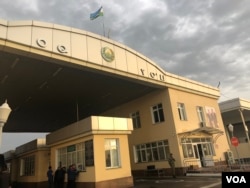As the world’s three superpowers jostle for influence in Central Asia, residents of the region are looking at the competition among Russia, China and the United States not as a choice but as a buffet table from which they hope to choose the most appealing entrees.
“My husband and his brothers have been migrant workers in Russia for years. We live in Chinese-built apartments bought with the money they sent us. Our children learn English and dream of studying in America,” said Muqaddas, an Uzbek mother who asked that only her first name be used.
“We are grateful for any opportunity,” she added in an interview during last winter’s energy shortages, when millions of Uzbeks suffered through freezing temperatures amid suspicions that Tashkent’s backroom dealing with Moscow and export of natural gas to China may have fueled the crisis.
Food producers and medical providers in Kazakhstan also relish strong sales to their two near neighbors while hoping for more American investment.
“Do we have the luxury to choose? Can we say no to Russia and China, especially commerce or business?” one asked rhetorically.
Migrants crossing the Uzbek-Tajik border told VOA they were determined to work in Russia despite the uncertainties and economic slowdown caused by Moscow’s invasion of Ukraine.
“Russia is vast,” said Nurali, 37, a trucker. “It is never easy, but once you obtain the required documents, you want to make money and provide your family with a decent life. I’m not thinking of leaving my job in Russia.”
For many, Russia still dominant
Tajik researcher and artist Loli Sanam told VOA that perceptions vary based on the knowledge and experience of each individual, but for many, Russia is still the dominant power it was when the region was part of the Soviet Union.
“There is a large segment that does not believe in anything that is not in the Russian language,” she said. “There is a collective memory about Russia as a big brother and indispensable influencer.”
But Sanam noted the growing number of English-language information consumers. “It is still a minority who values democracy, especially the freedom of expression,” she said.
Sanam said she sees the population becoming polarized between those who favor Russia and those who like America, while Chinese cultural influence seems limited, at least for now. “There are few people who speak Chinese in the region.”
Tajikistan’s reliance on Chinese financing and its growing debt to Beijing are seen as an immense burden on the next generation, she added.
In Kyrgyzstan, which shares over 1,000 kilometers of border with China, the public has expressed more anti-Chinese sentiment through protests and petitions over the years, but local observer Saida Sayip defines the mood toward China as “relatively neutral.”
"Our country wants to be the gateway for Chinese products,” Sayip said.
Uzbek specialist Husanjon Ganiev, who was educated in Japan, Singapore, South Korea and Malaysia but does business in the U.S., sees the region’s future as tightly connected with Asia.
"More deals with the West, for sure. But realistically speaking, the region’s focus will continue to shift towards the east and south,” Ganiev predicted. “Unless Russia dramatically changes, its influence will only plunge.”
“America will always be a beacon of innovation and inspiration. It does not have to invest billions to be relevant,” he continued. “People understand that prime partners are those geographically close, yet they want to learn from the U.S. experience and count on its technical support.”
Gallup’s 2022 Central Asia findings
Ganiev’s forecast of declining Russian influence is borne out in polling by the Gallup Organization, which surveyed residents of Kazakhstan, Kyrgyzstan and Uzbekistan about their views of the three competing powers in 2021 and 2022.
In Kazakhstan, approval of the leadership in Moscow declined from 55% to 29% between the two polls, likely driven by unhappiness over the invasion of Ukraine. Approval of Russia dropped from 76% to 63% in Kyrgyzstan and from 69% to 63% in Uzbekistan.
“For the first time since we began collecting data in Kazakhstan in 2007, more Kazakhstanis, about 50%, disapproved of the Russian leadership,” Zacc Ritter of Gallup said in an interview.
In 2014, when Russia invaded Crimea and pro-Moscow separatists waged war in eastern Ukraine, 72% of Kazakhs favored the Kremlin, while only 6% condemned it.
Ritter told VOA that “those who self-identify as Russian in Kazakhstan still mostly approve of the Russian leadership. However, that gap has narrowed dramatically: 47% approve, 37% disapprove.”
In Kyrgyzstan, 30% said they disapproved of Russian leadership last year, while the figure stood at just 18% in Uzbekistan.
Attitudes toward Washington and Beijing changed little between the two surveys. In Kyrgyzstan, 28% approved of U.S. leadership and 35% approved of the Chinese. In Uzbekistan, it was 29% for America and 31% for China. In Kazakhstan, support for the U.S. was 31% and for China 35%.
“More folks in Kyrgyzstan and Uzbekistan approved of Russia’s leadership than the U.S. or Chinese. In contrast, slightly more in Kazakhstan approved of Chinese and U.S. than the Russian,” Ritter said.
American observations
Laura Kennedy, a former U.S. ambassador to Turkmenistan and deputy assistant secretary of state who recently toured the region, told VOA that socioeconomic and political factors are “often overlooked by just focusing on international jostling for position by Russia, China and the U.S.”
Kennedy assessed that the older generation’s reliance on Russian television “clearly affects their views of America, but the younger generation is learning English and wants more access to all things Western.”
“They also have a much greater tendency to view Russia’s legacy more critically in terms of colonialism. But I met countless folks in Uzbekistan, Kyrgyzstan and Tajikistan with at least one relative who works in Russia. So, the economic pull of ruble remittances is still strong,” she said.
Kennedy detected some resentment toward China. She said she heard Tajiks and Kyrgyz complaining about the costs of doing business and the unwillingness of governments to speak out against Chinese persecution of Uyghurs, a fellow Turkic-Muslim people.
“Many believe that China wants market dominance. I also encountered cynicism about Chinese money going into elite pockets,” she said.
“The U.S. is not a statist economy like China nor suited as a government to build big physical projects a la the Belt and Road Initiative,” Kennedy said. “However, we still dominate the international market for ‘smart’ power, so we need to showcase that.”









